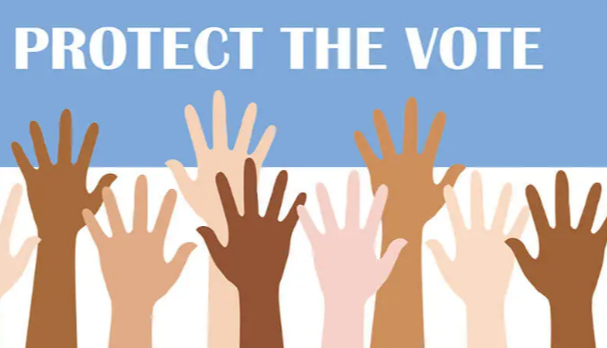(ThyBlackMan.com) “As long as some among us are oppressed–and we are part of that oppression–it must blunt our faith and sap the strength of our high purpose. Thus, this is a victory for the freedom of the American Negro. But it is also a victory for the freedom of the American Nation. And every family across this great, entire, searching land will live stronger in liberty, will live more splendid in expectation, and will be prouder to be American because of the act that you have passed that I will sign today.” – President Lyndon B. Johnson, on signing the Voting Rights Act of 1965

Last week in Chicago, the National Urban League joined with the Brennan Center and Democracy SENTRY for a conversation on voting rights.
“One of the first things I want to do, should we have the presidency and keep the majority, is change the rules and enact both the Freedom to Vote Act and the John Lewis Act,” Keynote speaker Senate Majority Leader Chuck Schumer said.
He later told reporters, “This is vital to democracy. This is not just another extraneous issue. This is the wellspring of it all.”
The sentiment was echoed by Vice President Harris in her acceptance speech, when she noted that among the “fundamental freedoms” at stake in the election is “the freedom that unlocks all the others: the freedom to vote.”
When the Supreme Court stripped the preclearance provision from the Voting Rights Act, Chief Justice John Roberts argued that “the conditions that originally justified these measures no longer characterize voting in the covered jurisdictions.”
Within hours, lawmakers in Texas and Alabama proved how wrong he was, announcing they would move forward with restrictive voting laws that had been blocked under the preclearance provision.
The John Lewis Voting Rights Advancement Act would update the preclearance formula that Roberts called “outdated,” reinvigorating the Voting Rights Act of 1965 and strengthening legal protections against racially motivated voter suppression.
Some changes would require preclearance nationwide, such as creating at-large districts or changing jurisdiction boundaries in places with large populations of color, imposing stricter documentation or ID requirements to vote, making it easier to purge voters of color from the rolls, or significantly reducing the opportunity to vote in communities of color.
Other provisions of the John Lewis Act include:
- Making Election Day a public holiday.
- Expanding voter registration, including same-day and automatic registration.
- Expanding early voting and vote-by-mail options.
- Requiring public announcement of voting changes at least 180 days before an election.
- Enabling the federal government to dispatch observers to polling places with a noted pattern of discrimination.
- Expanding restrictions on campaign spending by foreign nationals.
- Banning partisan gerrymandering.
- Make it a criminal offense to “corruptly hinder, interfere with, or prevent another person from registering to vote or helping someone register to vote.”
Since the Shelby decision, states have added at least 100 restrictive voting laws. Voters in almost half the country will face new voting restrictions this fall. And if the architects of the extremist Project 2025 agenda have their way, voting rights will be even further eviscerated. The Civil Rights Division of U.S. Department of Justice, which enforces civil provisions of the federal laws that protect the right to vote, would be eliminated. The FBI would be prohibited from combating the spread of misinformation and disinformation, which has given rise to election-related violence and harassment of election workers.
Next year marks the 60th anniversary of the Voting Rights Act. Will we meet that anniversary proudly, having honored the promises of the Act? Or will those promises lie shattered at our feet?
Written by Marc Morial
Official website; http://twitter.com/MARCMORIAL

















Leave a Reply